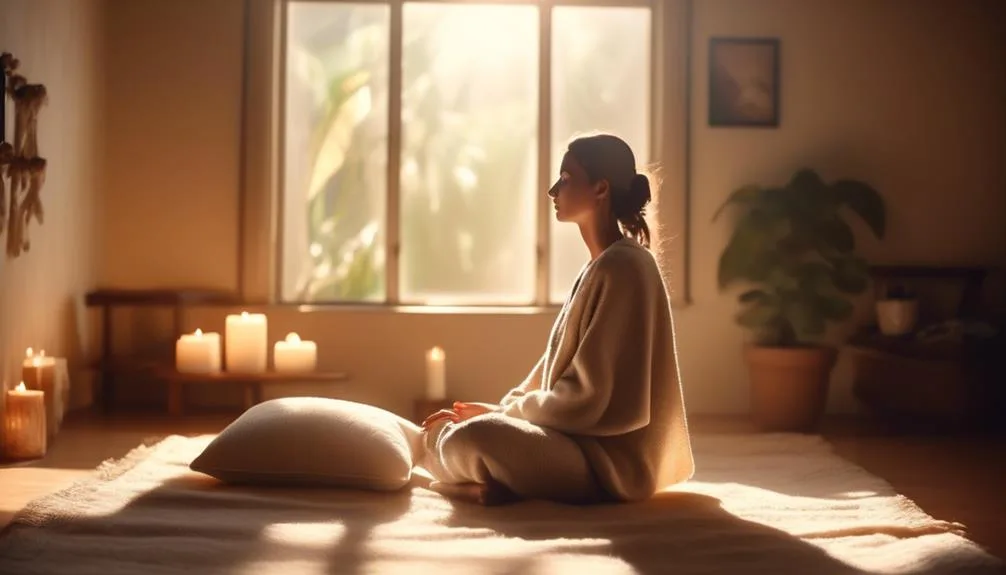Are you searching for a way to find inner peace and happiness in your life? You may have heard about the transformative power of guided meditation. But is it really possible to unlock your inner peace and happiness through this practice?
In this article, we will explore the truth behind this theory and discover how guided meditation can help you achieve a state of tranquility and contentment. So, if you're ready to embark on a journey towards a more peaceful and joyful existence, keep reading to uncover the secrets of guided meditation and how it can transform your well-being.
Key Takeaways
- Guided meditation is a relationship-based practice that benefits both beginners and experienced meditators.
- It provides oral instructions and guidance, incorporating techniques like meditation posture, breath attention, body scanning, and guided imagery.
- Guided meditation can be a valuable tool in therapy and counseling, with positive effects on stress management and preventing relapse in depression and anxiety.
- Different types of guided meditation, such as loving-kindness meditation and compassion meditation, have specific benefits like enhancing emotional regulation, empathy, and perspective taking.
Benefits of Guided Meditation
Guided meditation offers a multitude of benefits that can help you cultivate inner peace and happiness. One of the key benefits is stress reduction. By engaging in guided meditation, you can learn techniques to calm your mind and release tension in your body. The guided instructions will help you focus on the present moment, allowing you to let go of worries and anxieties that contribute to stress.
Another benefit of guided meditation is better sleep. Many people struggle with insomnia or have difficulty falling asleep due to racing thoughts. Guided meditation can provide you with the tools to relax your mind and body, creating a peaceful state that promotes restful sleep.
Types of Guided Meditation

As we explore the different types of guided meditation, we can deepen our understanding of how these practices can enhance inner peace and happiness. There are various meditation techniques that have been studied and supported by scientific research.
One popular type is loving-kindness meditation (LKM), which originated from ancient Buddhist practices. LKM focuses on cultivating feelings of love, compassion, and kindness towards oneself and others. It has been found to have positive effects on emotional regulation and enhancing prosocial feelings.
Another type is compassion meditation, which involves sending compassion and healing energy to a friend or loved one who's suffering. Scientific research has shown that compassion meditation can help increase feelings of empathy and connection to others.
How to Get Started With Guided Meditation

To begin your journey into guided meditation, take a moment to find a quiet and comfortable space where you can fully relax and focus on your inner peace and happiness. Guided meditation is a wonderful tool for beginners because it provides oral instructions and guidance throughout the practice.
One of the benefits of mindfulness meditation is its positive effects on stress management and preventing relapse in depression and anxiety. As a beginner, there are a few techniques you can use to get started with guided meditation. Familiarize yourself with different meditation postures, such as sitting or lying down with a straight spine.
Make sure you're familiar with the practice before guiding others, and pace your guidance properly, avoiding too much repetition or silence. Using a calm and measured tone of voice when guiding others can also enhance the experience. Lastly, consider recording your guided meditation for practice and confidence-building.
Enjoy your journey into guided meditation and discover the many benefits it can bring to your life.
Guided Meditation for Anxiety Relief

As you continue your journey into guided meditation, explore the profound benefits it can bring to your life by delving into the practice of guided meditation for anxiety relief. This specialized form of meditation can help reduce stress and promote better sleep, allowing you to find inner peace and calm amidst the challenges of everyday life.
Guided meditation for stress reduction:
- Through guided meditation, you can learn techniques to manage and alleviate stress.
- Guided meditations often incorporate breath awareness and body scanning, helping you release tension and cultivate relaxation.
- By following the guidance of a teacher or recorded meditation, you can develop a deeper sense of mindfulness and presence, allowing stress to melt away.
Guided meditation for better sleep:
- Guided meditations can help quiet the mind and relax the body, creating an ideal environment for restful sleep.
- By focusing on your breath and engaging in gentle body scans, you can release racing thoughts and physical tension that may interfere with sleep.
Guided Meditation for Inner Peace and Happiness

Experience a guided meditation that will lead you on a journey towards inner peace and a deeper sense of happiness. Guided meditation can be a powerful tool for stress reduction and self-discovery.
When you engage in a guided meditation practice, you'll be provided with oral instructions and guidance, allowing you to follow along and explore different techniques such as meditation posture, breath attention, body scanning, and guided imagery. These techniques can help you relax, reduce stress, and cultivate a sense of calm and well-being.
By creating a space for self-reflection and introspection, guided meditation can also support you in understanding yourself on a deeper level and discovering your own inner resources for happiness and peace.
Frequently Asked Questions
Can Guided Meditation Be Done Without a Teacher or Instructor?
Yes, you can practice self-guided meditation at home without a teacher. It offers benefits like reducing stress, improving sleep, and enhancing emotional well-being. With practice, you can unlock inner peace and happiness.
Is It Necessary to Have Prior Meditation Experience to Benefit From Guided Meditation?
No, prior meditation experience is not necessary to benefit from guided meditation. It offers oral instructions and guidance, making it accessible for beginners. You can unlock inner peace and happiness through guided meditation, even without prior experience.
Can Guided Meditation Be Used as a Form of Therapy?
Yes, guided meditation can be used as a form of therapy. It has been found to be effective for mental health, helping to reduce stress, anxiety, and depression. It provides guidance and support for healing and inner peace.
How Long Should a Guided Meditation Session Typically Last?
To stay focused during a guided meditation, keep your sessions short and reap the benefits. Short sessions can help alleviate stress and anxiety, improve sleep, and enhance cognitive and emotional well-being.
Are There Any Potential Risks or Side Effects Associated With Guided Meditation?
There are few potential risks or side effects associated with guided meditation. It is generally safe, but it's important to follow precautions and contraindications. Research supports the effectiveness of guided meditation for mental health and stress reduction.
Conclusion
In conclusion, guided meditation is a powerful tool for finding inner peace and happiness.
Research has shown that just 10 minutes of guided meditation a day can reduce stress and anxiety by up to 40%.
This practice offers a unique combination of techniques that can enhance mindfulness and relaxation, making it accessible to beginners and experienced meditators alike.
By incorporating guided meditation into your daily routine, you can unlock a sense of tranquility and well-being that will positively impact all aspects of your life.

